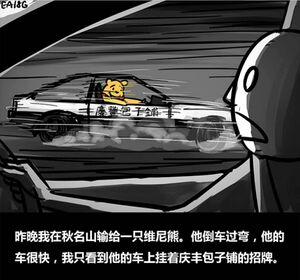倒车:修订间差异
跳到导航
跳到搜索
 小 (→评论) |
 (→简介) |
||
| (未显示另一用户的1个中间版本) | |||
| 第4行: | 第4行: | ||
==简介== | ==简介== | ||
在习的统治下,全国文娱开始大萧条,特别是修宪之后,取消了连任期限,而议员们又都是当花瓶的投票机器,民主开始消失,取而代之的是习的独裁,{{黑幕|梦回1916<ref>袁世凯称帝</ref>}},修宪之后,开始有大量网友用倒车一词形容习的政策,后来大量红色作品的播出更是助长了个人崇拜,并使得这一词语开始广泛出现。 | 在习的统治下,全国文娱开始大萧条,特别是修宪之后,取消了连任期限,而议员们又都是当花瓶的投票机器,民主开始消失,取而代之的是习的独裁,{{黑幕|梦回1916<ref>袁世凯称帝</ref>}},修宪之后,开始有大量网友用倒车一词形容习的政策,后来大量{{黑幕|粉}} 红色作品的播出更是助长了个人崇拜,并使得这一词语开始广泛出现。 | ||
==评论== | ==评论== | ||
历史学者孙万国认为这种对习近平的个人崇拜相当集权独裁,要求意识形态上的忠诚:宣传部门塑造习近平反西方、对欧美普世价值不屑一顾、以恐惧来统治、打压持不同政见者、以及对媒体、教育及文化收紧控制,是在走毛泽东崇拜的回头路。而一些西方国家的民间也认为习近平修宪取消连任限制是在“开历史倒车”。<ref name="Wen2016">{{cite news|author=Philip Wen|title=China's Great Leap Backwards: Xi Jinping and the cult of Mao|url=https://www.smh.com.au/world/chinas-great-leap-backwards-xi-jinping-and-the-cult-of-mao-20160512-gotfiz.html|date=2016-05-15|newspaper=Sydney Morning Herald|language=en|quote=But perhaps the most stunning characteristic shared with Mao has been a growing personality cult around Xi fanned by the central propaganda department, which has produced some jarring results: newspaper front-pages dominated by Xi's every move, saccharine music videos professing love and loyalty to the leader."It does harken back to Mao, this personality cult, the concentration of power by casting aside the collective leadership … now his style is quite dictatorial, demanding loyalty ideologically," says Sun, the historian. "He's anti-Western, dismissive of universal values and he also rules by fear, in the form of the anti-corrupt campaigns and cracking down on dissent and tightening the control on media, education, culture – all this does harken back to Mao's practice."|access-date=2019-01-01|archive-url=https://web.archive.org/web/20190102002112/https://www.smh.com.au/world/chinas-great-leap-backwards-xi-jinping-and-the-cult-of-mao-20160512-gotfiz.html|archive-date=2019-01-02|dead-url=no}}</ref> | 历史学者孙万国认为这种对习近平的个人崇拜相当集权独裁,要求意识形态上的忠诚:宣传部门塑造习近平反西方、对欧美普世价值不屑一顾、以恐惧来统治、打压持不同政见者、以及对媒体、教育及文化收紧控制,是在走毛泽东崇拜的回头路。而一些西方国家的民间也认为习近平修宪取消连任限制是在“开历史倒车”。<ref name="Wen2016">{{cite news|author=Philip Wen|title=China's Great Leap Backwards: Xi Jinping and the cult of Mao|url=https://www.smh.com.au/world/chinas-great-leap-backwards-xi-jinping-and-the-cult-of-mao-20160512-gotfiz.html|date=2016-05-15|newspaper=Sydney Morning Herald|language=en|quote=But perhaps the most stunning characteristic shared with Mao has been a growing personality cult around Xi fanned by the central propaganda department, which has produced some jarring results: newspaper front-pages dominated by Xi's every move, saccharine music videos professing love and loyalty to the leader."It does harken back to Mao, this personality cult, the concentration of power by casting aside the collective leadership … now his style is quite dictatorial, demanding loyalty ideologically," says Sun, the historian. "He's anti-Western, dismissive of universal values and he also rules by fear, in the form of the anti-corrupt campaigns and cracking down on dissent and tightening the control on media, education, culture – all this does harken back to Mao's practice."|access-date=2019-01-01|archive-url=https://web.archive.org/web/20190102002112/https://www.smh.com.au/world/chinas-great-leap-backwards-xi-jinping-and-the-cult-of-mao-20160512-gotfiz.html|archive-date=2019-01-02|dead-url=no}}</ref> | ||
{{乳包}} | {{乳包}} | ||
==注释与外部链接== | ==注释与外部链接== | ||
{{reflist}} | {{reflist}} | ||
2021年9月10日 (五) 17:32的最新版本
简介[编辑 | 编辑源代码]
在习的统治下,全国文娱开始大萧条,特别是修宪之后,取消了连任期限,而议员们又都是当花瓶的投票机器,民主开始消失,取而代之的是习的独裁,梦回1916[1],修宪之后,开始有大量网友用倒车一词形容习的政策,后来大量粉红色作品的播出更是助长了个人崇拜,并使得这一词语开始广泛出现。
评论[编辑 | 编辑源代码]
历史学者孙万国认为这种对习近平的个人崇拜相当集权独裁,要求意识形态上的忠诚:宣传部门塑造习近平反西方、对欧美普世价值不屑一顾、以恐惧来统治、打压持不同政见者、以及对媒体、教育及文化收紧控制,是在走毛泽东崇拜的回头路。而一些西方国家的民间也认为习近平修宪取消连任限制是在“开历史倒车”。[2]
| |||
注释与外部链接[编辑 | 编辑源代码]
- ↑ 袁世凯称帝
- ↑ Philip Wen. China's Great Leap Backwards: Xi Jinping and the cult of Mao. Sydney Morning Herald. 2016-05-15 [引用时间: 2019-01-01]. (原始内容存档于2019-01-02) (English).
But perhaps the most stunning characteristic shared with Mao has been a growing personality cult around Xi fanned by the central propaganda department, which has produced some jarring results: newspaper front-pages dominated by Xi's every move, saccharine music videos professing love and loyalty to the leader."It does harken back to Mao, this personality cult, the concentration of power by casting aside the collective leadership … now his style is quite dictatorial, demanding loyalty ideologically," says Sun, the historian. "He's anti-Western, dismissive of universal values and he also rules by fear, in the form of the anti-corrupt campaigns and cracking down on dissent and tightening the control on media, education, culture – all this does harken back to Mao's practice."



